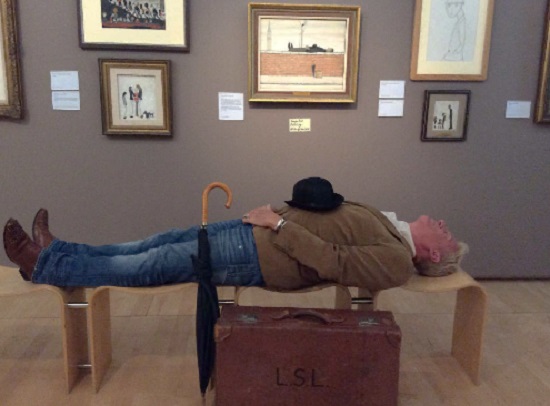Goteo and the case for match funding
Matching Public and Private Funds with Crowd Donations to Preserve and Re-use Digital Heritage: The Case of Goteo
This article, written by Platoniq together with Goteo Foundation, is an introduction to a study on match funding produced as part of their involvement in the Europeana Digital Service Infrastructure (DSI) project. Both organisations have been working with Europeana since 2014, designing services including co-creation, agile collaborative development and crowdfunding for re-user communities and content holders.

From the VanGoYourSelf crowdfunding campaign: Man Lying on a Wall, LS Lowry, vanGo'd by Tori Hryniw, CC-BY-SA
There are numerous institutions interested in promoting and supporting creative projects in culture, research, technology, or science. Sometimes, they find it difficult to make their contribution visible, to reach the right sector and audience, or to get communities engaged. Institutions also search for means to help these projects raise funds, better manage the high administration costs and ensure long-term project sustainability. A match funding programme provides a powerful tool to achieve all of the above.
In match funding, an institution makes a sum available to develop a specific area (culture, education, etc), then calls the community to submit projects in this area and appeals to the general public to pledge money. The crowd supports a specific project by making small fund donations that the institution matches with the same amount. For example, if the crowd donates 1,000€ to a specific project, the match funding institution (a public or private organisation) will also provide 1,000€, thus increasing the total project budget to 2,000€.
The match funding programmes have a clear “multiplier” effect. To start with, the credibility of the crowdfunded project increases when it has the institution’s hallmark. It receives the trust of the community and thus has a better chance of attracting crowd donations. The more crowd funds received, the higher the matching contribution by the institution and, as a result, the bigger the total project budget becomes. Data shows that a crowdfunding campaign with institutional support receives on average 180% more from crowd donations than a campaign without institutional support. Also, its success probability (reaching the minimum set campaign/project budget) is increased by up to 90% (in comparison to 71% success rate for campaigns without match funding).
A good example for this multiplier effect is the VanGoYourSelf crowdfunding campaign. The VanGoYourself (VGY) online service was developed with the Europeana Creative project and inspires people to take a photograph of themselves while recreating well-known paintings and share the results. The VGY team ran a crowdfunding campaign on the Goteo platform during June-July 2015 to support their next development phase. For every 1€ the crowd gave to the project, the International University of Andalusia (UNIA) gave another 1€ , with a limit of up to 100€ per contribution. As there were numerous contributions above 100€, the total amount given by UNIA was 1,436€ which matched the 4,031€ given by the crowd. The campaign was successfully closed by exceeding the set budget of 5,000€.
Goteo Foundation has conducted eight match funding calls with public institutions. We gathered valuable data, which will enable the platform to improve its means for projects to build broader communities, and for match funder organisations to communicate the benefits and impact of this hybrid funding model. During the DSI1 project period, Goteo carried out research which identified opportunities for further improvements to data facilitation and visualization. All improvements have been documented on Goteo Foundation’s Github and in the API matchfunding entry point for developers.
Of particular importance is the visualisation of the budgets committed to each match funding program and the flows generated by crowdfunders, as well as their social impact and geographical reach. Having this data available allows for new forms of storytelling. Goteo’s match funding site now includes a map of influence, showing campaign’s locations, gender balance, and types of organizations willing to launch projects. When a campaign is active, the map of influence becomes a map of capital flow demonstrating the strength of the multiplier effect and the co-responsible contributions.
Another important development is the "pledger's wallet", which is an account for partners to pledge any sum at any time, and later decide which campaign(s) should receive the funds held in this virtual wallet. This feature is particularly relevant because Goteo is a foundation which allows both citizen supporters and participating private institutions in Spain to receive tax returns against their contributions to a crowdfunding campaign on Goteo. Goteo Foundation, together with Europeana, is already working on expanding this model on a European level by building a network of foundations across Europe which will serve as project certifiers to the local tax authorities.Through donation certification from the respective foundation in their country of origin, users outside Spain who make a donation to a campaign on Goteo will receive a return on their donation from the local tax authorities.
All ideas and improvements outlined here aim to inspire institutions to release new crowdfunding calls and to encourage potential campaign initiators not only to apply, but also to detect the priorities and interests of their communities. Institutions can reach into sectors and audiences who do not usually apply for grants or public funding; they can identify new topics and specific types of projects that attract the interest of their communities. A study to define the needs related to a specific topic or community, or section of a community, can also be conducted by Goteo to inform future calls and tenders of a match funding institution.
Goteo Foundation and Platoniq will host a special seminar on match funding on 1 and 2 December 2016 in Barcelona. To find out more about the seminar, contact Platoniq: [email protected]
